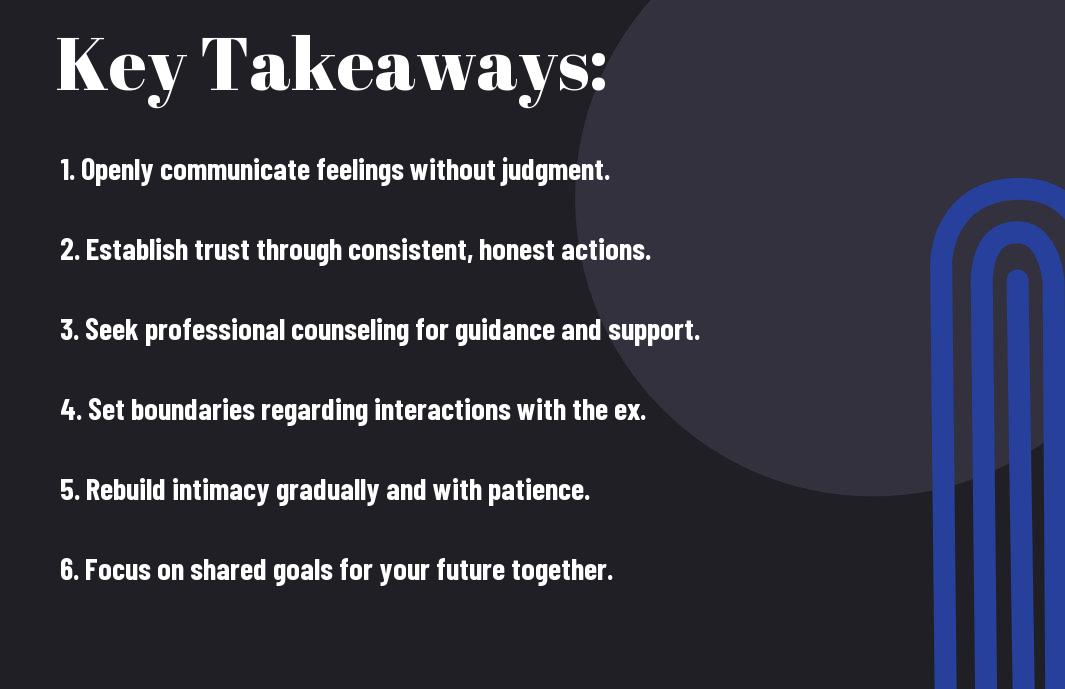Key Takeaways:
- Open communication is necessary; discuss feelings and expectations honestly with your partner.
- Establish boundaries regarding contact with the ex-partner to rebuild trust.
- Therapy or counseling can provide guidance and support for both partners during the healing process.
- Practice forgiveness, recognizing that healing takes time for both individuals.
- Focus on rebuilding intimacy and connection to strengthen your relationship.
- Engage in joint activities to foster teamwork and unity in moving forward.
- Set realistic goals for your relationship, celebrating small victories along the way.

Understanding Infidelity
Your journey toward healing begins with a clear understanding of infidelity. It often encompasses emotional or physical betrayal, leading to a breakdown of trust in your relationship. Recognizing the complexity of this issue is necessary as you work to repair the damage and regain stability in your marriage.
Definition of Infidelity
With infidelity defined as a breach of trust, it typically involves one partner engaging in romantic or sexual relations outside the marriage. However, emotional connections can also qualify as infidelity, highlighting the varying degrees of betrayal that can occur within your relationship.
Common Reasons for Infidelity
Among the reasons people may stray from their commitment are a lack of intimacy, unmet emotional needs, or feelings of loneliness. External factors, such as stressful life events or poor communication, can also play a significant role in driving one partner towards seeking solace outside the marriage.
Reasons for infidelity can vary widely among individuals, but some patterns emerge. Lack of emotional connection is often a significant factor, pushing individuals to find validation elsewhere. Life stressors can exacerbate feelings of isolation, making an affair seem like a viable escape. In other cases, the thrill of the chase can lead to impulsive decisions. Understanding these emotional triggers can help you and your partner address the underlying issues, paving the way for healing and rebuilding trust.

Assessing the Damage
You must take a hard look at the impact of infidelity on your marriage. It’s crucial to understand how the betrayal has affected both you and your partner. This process involves acknowledging the hurt feelings, lost trust, and emotional distance that may have developed as a result of the affair. Consider the extent to which these issues have permeated your relationship and whether you still share the same goals and desires for your future together.
Emotional Impact on the Relationship
Any infidelity within your relationship typically leaves deep emotional scars. You may experience a whirlwind of feelings, ranging from anger and betrayal to confusion and sorrow. Both partners often feel a loss of safety and security, which can lead to further resentment and communication breakdown. Addressing these feelings openly can pave the way for healing, ultimately allowing you to decide if your marriage can be rebuilt stronger or if it is time to move on.
Identifying Underlying Issues
Behind the betrayal, various underlying issues may have contributed to the situation. You should explore whether communication gaps, unmet needs, or personal struggles exist within your marriage. This reflection may reveal patterns that allowed the infidelity to occur in the first place. Understanding these factors can help you and your partner engage in constructive conversations about your relationship’s health.
Underlying issues in your marriage may manifest as emotional distance, unresolved conflicts, or even a lack of intimacy. By addressing these concerns directly, you can acknowledge the root causes that led to the infidelity. Finding patterns in your behavior or emotional exchanges can shed light on larger problems that need to be tackled to foster healing. Additionally, recognizing these issues will provide a foundation for more profound discussions, ultimately equipping both partners to work collaboratively towards a healthier relationship dynamic.

Communication Strategies
All relationships thrive on effective communication. To rebuild trust after infidelity, you need to develop a strategy that fosters openness and understanding between you and your partner. This involves actively listening, sharing feelings, and avoiding blame. By establishing a safe space for dialogue, you create an environment that encourages honest discussions without fear of judgment, making it easier to navigate the complexities of your relationship.
Open and Honest Conversations
Open communication is vital for healing. As you discuss feelings of hurt, betrayal, and anger, ensure that you express your emotions candidly, while also listening to your partner’s perspective. Allowing each other to share without interruption lays the groundwork for a deeper understanding of your relationship and the steps needed to heal.
Setting Boundaries and Expectations
One effective strategy is setting clear boundaries and expectations. Define what is acceptable and unacceptable behavior in your relationship moving forward to establish trust and reassurance.
It’s vital that you and your partner discuss and agree on guidelines that help rebuild your relationship. This may include transparency about social interactions, limiting contact with the ex, or affirming your commitment to each other. Setting these strong guidelines can help you both regain a sense of security. Moreover, it’s important to regularly revisit and adjust these boundaries as needed, ensuring that both you and your partner feel valued and understood throughout the process. This commitment to mutual respect fosters a healthier, more secure bond, increasing the likelihood of long-term success in your marriage.
Rebuilding Trust
Many couples find themselves grappling with the aftermath of infidelity, especially when an ex is involved. To move forward, it’s necessary to rebuild trust, which can be a difficult yet rewarding process. Engaging in transparent communication and seeking guidance from resources like Life After Divorce: How the Unfaithful Sees It can help you navigate this journey.
Steps to Regain Trust
Regain trust by consistently demonstrating sincerity and accountability. Acknowledge past mistakes while actively working to create a safe emotional space for your partner. This involves openly discussing feelings and fears, thereby inviting vulnerability that enhances connection.
Importance of Transparency
Rebuilding trust hinges on transparency. When you’re open about your thoughts, feelings, and actions, it fosters an environment where both partners can express their needs and concerns. This honest dialogue is vital in transforming the relationship dynamics.
Steps to establish transparency might include sharing details of your daily life, addressing insecurities, and setting clear boundaries. By being intentional about showing your commitment, you reinforce your partner’s sense of safety. This process not only helps in repairing trust but also strengthens the emotional bond between you both, paving the way for a healthier future together.
Seeking Professional Help
Keep in mind that navigating the aftermath of infidelity can be complex and emotionally taxing. Seeking professional help, such as couples therapy, can provide a safe space for both you and your partner to express your feelings and work towards rebuilding trust. A skilled therapist can guide you through the healing process, equipping you with tools to address underlying issues and improve communication.
Benefits of Couples Therapy
Above all, couples therapy offers a supportive environment where both partners can explore their emotions and engage in honest dialogue. This process can help you identify patterns that led to infidelity, foster empathy, and ultimately strengthen your relationship. By having an objective party facilitate discussions, you may find solutions to recurring conflicts and experience increased intimacy and understanding.
Choosing the Right Therapist
Benefits of selecting the appropriate therapist cannot be understated. Finding a professional who specializes in infidelity and has experience in couples therapy is vital for effective healing. Look for therapists who create a non-judgmental atmosphere, allowing both partners to feel heard. You might consider reading reviews, checking credentials, and scheduling initial consultations to gauge compatibility.
It’s important to prioritize your emotional safety when selecting a therapist. Look for a licensed professional with a background in relationship dynamics and a track record of helping couples through infidelity. Ensuring that the therapist fosters a supportive environment where both you and your partner can engage openly is vital. Being comfortable with the therapist can significantly enhance the healing experience, allowing for more honest conversations about your feelings and rebuilding trust in your relationship.
Creating a New Foundation
To rebuild your marriage after infidelity, it’s vital to create a new foundation based on trust, understanding, and mutual dedication. This process involves open communication and a commitment to growth, enabling both partners to feel valued and secure. Establishing new norms will lay the groundwork for a healthier relationship moving forward, allowing you to leave past mistakes behind and embrace a future filled with hope and shared goals.
Setting New Relationship Goals
Below, clarify what you both envision for your relationship going forward. Outline specific goals that reflect your shared values and aspirations. Whether it’s enhancing communication, spending more quality time together, or fostering forgiveness, having tangible objectives will help guide your actions and reinforce your commitment to each other.
Cultivating Emotional Intimacy
Relationship transformation involves deepening emotional intimacy. This means sharing your thoughts, feelings, and insecurities openly, allowing your partner to truly understand you. Engage in meaningful conversations and be honest about your needs, which can significantly strengthen your bond. Building this intimacy may take time, but the process fosters connection and trust, making it less likely to fall into the traps of past hurts. Prioritize moments that encourage vulnerability, as they are vital for developing a loving and supportive environment.
The journey towards emotional intimacy requires intentional effort. You might find that spending time in one-on-one situations—like date nights or special activities—invites openness. Regularly check in on each other’s feelings and experiences, ensuring you both feel heard and understood. This practice can help transform your relationship dynamic, moving past the pain of infidelity and paving the way for a stronger partnership. Don’t shy away from discussing difficult subjects; addressing unresolved issues can illuminate the path toward forgiveness and increased emotional closeness.
Summing up
The journey to repair your marriage after infidelity involving an ex can be challenging but achievable. Open communication with your partner is crucial, allowing both of you to express feelings and concerns honestly. Setting healthy boundaries is vital to rebuild trust, while engaging in couples therapy can provide the support needed for deeper healing. Focus on nurturing your emotional connection and outline a shared vision for the future. With commitment from both sides, you can transform this difficult experience into an opportunity for growth and renewed intimacy in your marriage.
FAQ
Q: How can I start the healing process after infidelity with an ex?
A: Starting the healing process involves open and honest communication with your partner. It’s vital to acknowledge the pain and betrayal caused by the infidelity. Consider setting aside dedicated time to discuss your feelings and emotions. Both partners should express their thoughts and listen to each other without interruptions. Seeking the guidance of a trained therapist can also help facilitate these discussions and provide strategies for moving forward.
Q: Can trust be rebuilt after infidelity with an ex?
A: Yes, trust can be rebuilt, but it takes time and effort from both individuals. It involves setting clear boundaries and committing to transparency in the relationship. The partner who was unfaithful must take responsibility for their actions and be willing to answer any questions the hurt partner may have. Consistently showing reliability and honesty over time is key to restoring trust.
Q: What steps should I take to improve communication after infidelity?
A: Improving communication post-infidelity starts with establishing a safe space for dialogue. Begin with discussions about feelings and concerns related to the affair and the marriage. Active listening is vital—each partner should empathize and validate the other’s emotions. You may also consider using “I” statements (e.g., “I feel hurt when…”) to express feelings without sounding accusatory, fostering a more open conversation.
Q: Should we seek professional help during this process?
A: Seeking professional help is often beneficial when navigating the complexities of infidelity. A marriage counselor or therapist can provide a neutral space for both partners to express their feelings and work through underlying issues. They can offer strategies tailored to your situation, facilitate discussions, and help each partner understand their role in the relationship moving forward.
Q: How long does it take to heal from infidelity?
A: The time it takes to heal from infidelity varies for each couple. Some may find a sense of resolution in a few months, while others may require years to fully recover. The key factors include the level of commitment from both partners, the nature of the infidelity, and the tools employed in the healing process. Patience and understanding towards each other’s feelings are vital aspects during this journey.
